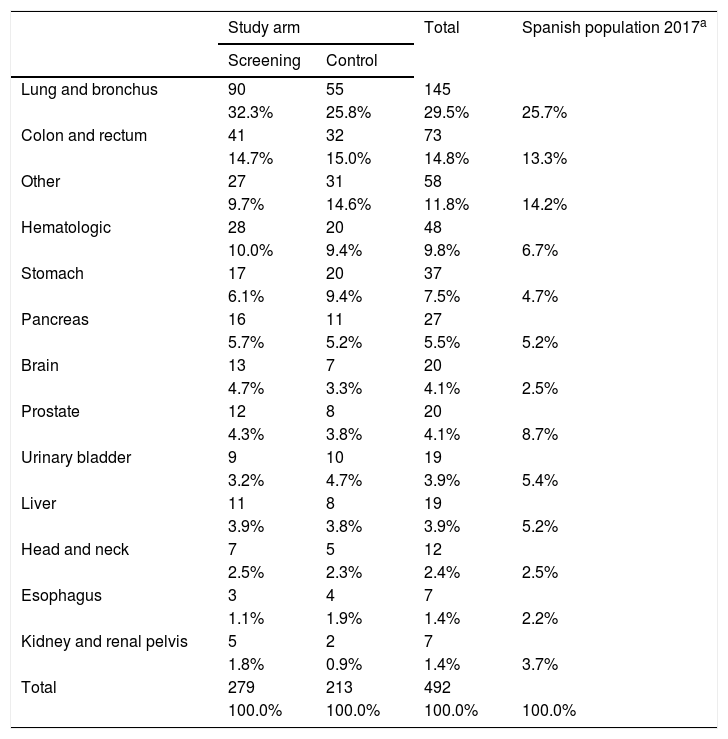The objective of the European Randomized Study of Screening for Prostate Cancer (ERSPC) is to assess whether prostate cancer (PCa) screening leads to an improvement of cancer-specific survival. This multicenter study (eight European countries) has recruited more than 180,000 asymptomatic men. After a follow-up period of 16 years, it has been shown that PSA screening reduces PCa mortality by 20%, and that it does not affect all-cause mortality. This article provides updated the results of the Spanish arm of the ERSPC after 21 years of follow-up.
Materials and methodsThe study invited 18,612 men (aged 45–70) of the Spanish section (Getafe and Parla, Madrid) to participate. They were randomly assigned to the intervention arm (serum PSA-based screening) and to the control arm (follow-up without intervention). The diagnoses of PCa were recorded, as well as the PCa-specific and all-cause mortality rates. A comparison between the survival curves of both arms of the study and detailed analysis of the causes of death were performed.
ResultsThe study finally included 4276 men (2415 intervention arm, 1861 control arm). The median age, serum PSA and follow-up time were 57 years, 0.9 ng/mL and 21.1 years, respectively. There were 285 cases with PCa diagnosis, 188 (7.8%) from the intervention arm and 97 (5.2%) from the control arm (P < ,001). A total of 216 (75.8%) presented organ-confined disease. There were 994 deaths were recorded; 544 (22.5%) in the intervention arm and 450 (24.2%) in the control arm. No significant differences were detected between the arms of the study in terms of cancer-specific (P = .768) or all-cause (P = .192) mortality rates. The main cause of death was malignant tumors (492 patients, 49.5% of overall mortality), and the most frequent sites were lung and bronchus (29.5%), colon and rectum (14.8%), and hematologic (9.8%). Only 20 patients (0.4% of the patients recruited) died from PCa, with no significant difference between study arms.
ConclusionsIn this update of the results of the Spanish section of the ERSPC study after 21 years of follow-up, we have not detected a benefit of PCa screening in terms of overall and cancer-specific survival.
El Estudio Randomizado Europeo de Screening del Cáncer de Próstata (ERSPC) tiene como objetivo probar si el cribado del cáncer de próstata (CaP) reduce la mortalidad por esta enfermedad. Este estudio multicéntrico (ocho países europeos) ha reclutado más de 180.000 varones asintomáticos. Tras un tiempo de seguimiento de 16 años se ha demostrado que el cribado con PSA reduce la mortalidad por CaP un 20%, sin efecto sobre la mortalidad global (por cualquier causa). En este artículo se ofrece una actualización de los resultados de la rama española del ERSPC tras 21 años de seguimiento.
Materiales y métodosComo centro participante en el ERSPC se invitó a participar en el estudio a 18.612 varones entre los 45 y 70 años de edad de los municipios de Getafe y Parla (Madrid). Randomización en brazo intervención (determinación de PSA sérico), y en brazo control (seguimiento sin realizar pruebas). Se registraron los diagnósticos de CaP, así como la mortalidad por CaP y por todas las causas, realizando comparación entre ambos brazos del estudio de las curvas de supervivencia, y análisis pormenorizado de las causas de muerte.
ResultadosEl estudio se llevó a cabo finalmente con 4.276 varones (2.415 brazo intervención, 1.861 brazo control). Las medianas de edad, PSA sérico y tiempo de seguimiento fueron 57 años, 0,9 ng/mL y 21,1 años respectivamente. Se diagnosticaron 285 CaP, 188 (7,8%) brazo intervención, 97 (5,2%) brazo control (P < ,001). Un total de 216 (75,8%) debutaron en estadio clínico organoconfinado. Se registraron 994 fallecimientos, 544 (22,5%) en el brazo intervención y 450 (24,2%) en el brazo control. No se detectaron diferencias significativas entre los brazos del estudio en términos de mortalidad cáncer-específica (P = ,768) o por todas las causas (P = ,192). La principal causa de muerte fueron los tumores malignos (492 pacientes, 49,5% del total de muertes), siendo los sitios primarios más frecuentes pulmón y bronquios (29,5%), colon y recto (14,8%), y hematológicos (9,8%). Sólo 20 pacientes (0,4% de los varones reclutados) fallecieron por CaP, sin diferencia significativa entre brazos del estudio.
ConclusionesEn esta actualización de los resultados de la rama española del estudio ERSPC tras 21 años de seguimiento, no hemos detectado un beneficio del cribado del CaP en términos de supervivencia global, ni cáncer específica.











